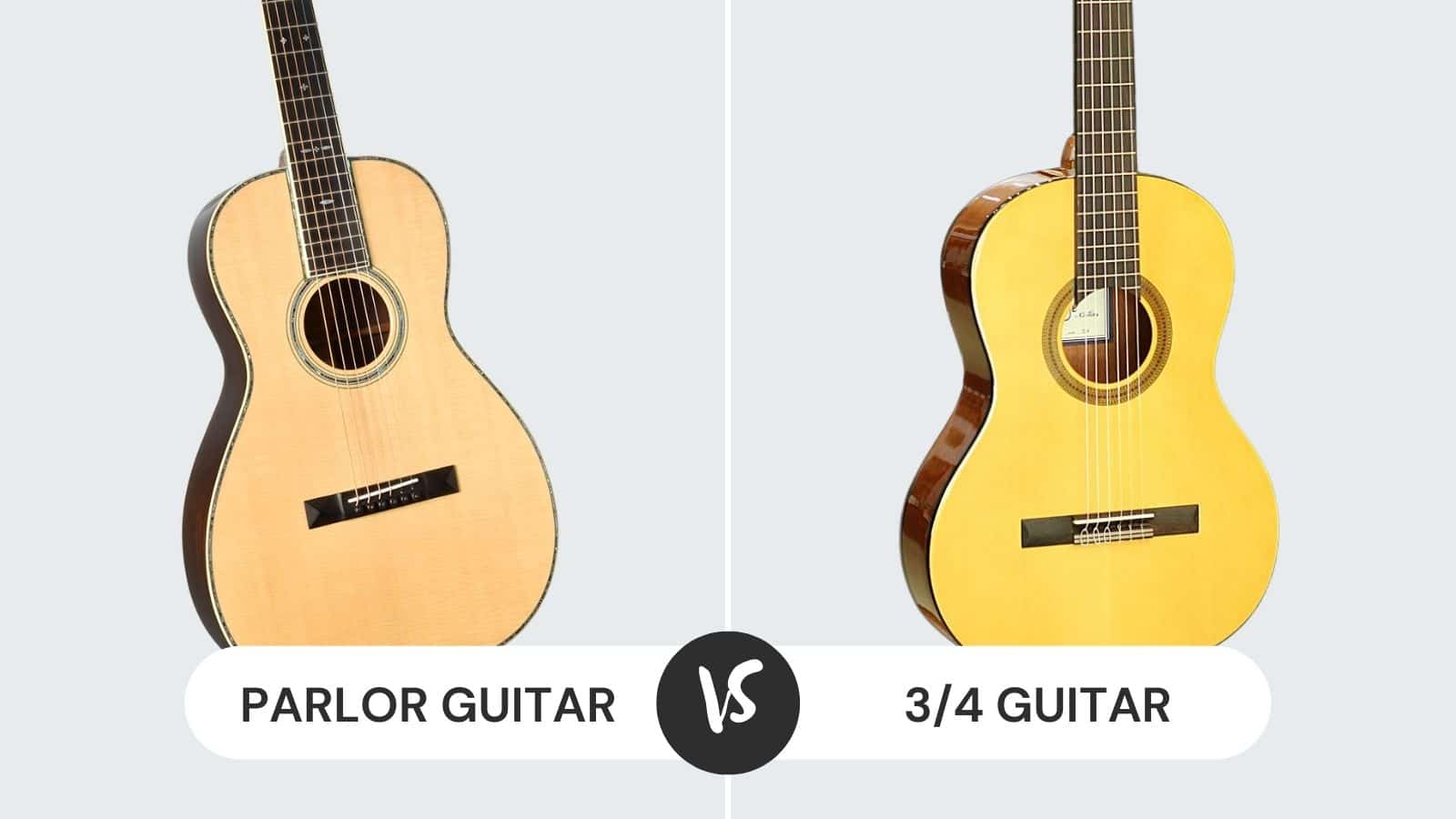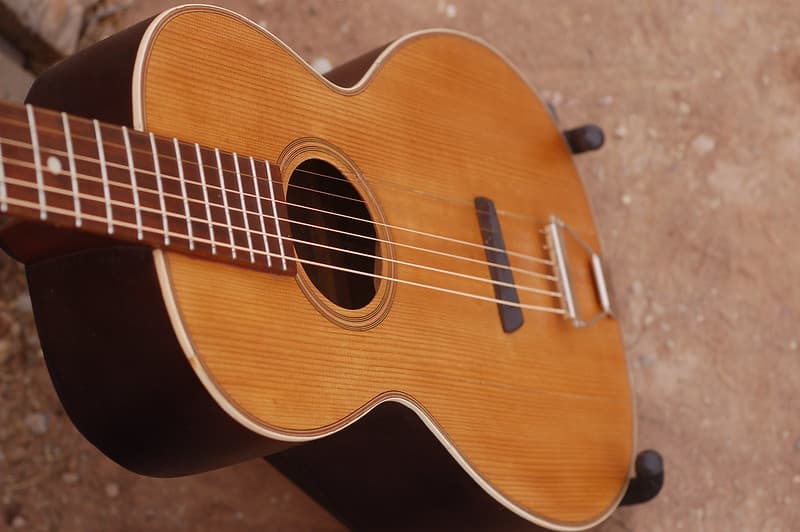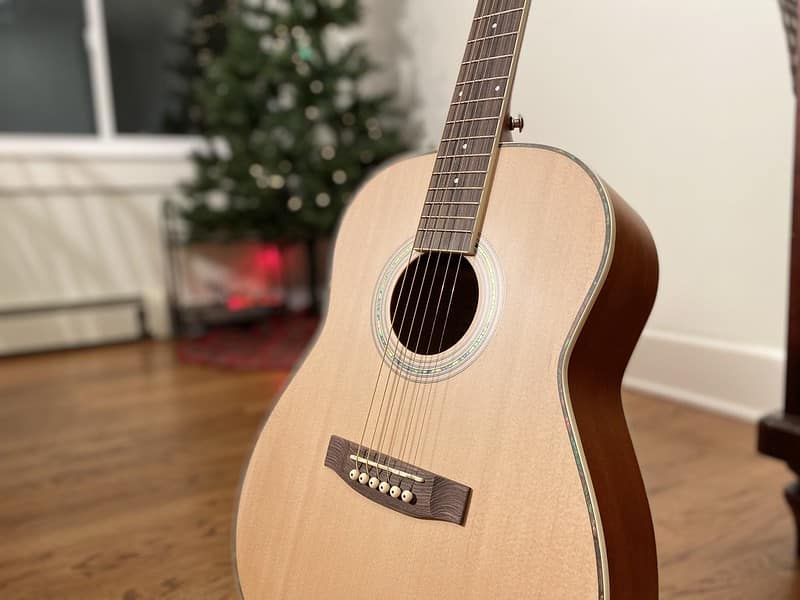
There are many different types of guitars available on the market, from acoustics and electrics to classical, small-sized Parlor or 3/4 guitar, and flamenco.
Acoustic guitars are the most popular type and are generally used for playing a wide variety of different styles, including rock, folk, blues, and jazz. They are typically made from wood or polymer materials and feature steel strings that help produce a bold sound.
Ultimately, the type of guitar you choose will depend on your own musical preferences and playing style. Whether you’re looking for a versatile acoustic instrument or something small-sized like Parlor guitars and ¾ guitars, there’s definitely a guitar out there that’s perfect for you.
Parlor Guitar vs ¾ Guitar
| Features | Parlor Guitar | ¾ Guitar |
|---|---|---|
| Type | Standard acoustic guitar | Small acoustic guitars |
| Body Shape | Smaller than standard acoustic Guitar | ¾ Classic |
| Size | 36-38 Inches | 36 x 13 Inches |
| Scale Length | Less than 25 inches | Less than 24 inches |
| Number of frets | Range From 18 to 19 | Less than 18 |
The parlor guitar is a popular type of guitar, and it originated in the 19th century. These guitars are small in size and have a mellower sound. They were typically played unamplified, making them ideal for intimate settings.
The ¾ guitar is a type of acoustic guitar that is popular among beginners. These guitars are smaller in size, making them easier to hold and play. They have a softer sound and are typically less expensive than full-sized acoustic guitars.
A parlor guitar and a ¾ guitar are two acoustic guitars typically used for beginner or casual players. Parlor guitars tend to be smaller in size, making them easier to play and handle, while ¾ guitars are larger and have a deeper tone than parlor guitars, which is ideal for more advanced musicians.
Both types of guitars have their own unique strengths and weaknesses, making them popular choices for players at different levels. Ultimately, choosing between a parlor guitar or a ¾ guitar will depend on your personal preferences and playing style.
Both parlor guitars and ¾ guitars have long been popular choices among beginning or casual players due to their compact size and relatively affordable cost. Parlor guitars tend to be even smaller than 3/4 guitars, making them even more suitable and less experience.
They also tend to have a lighter, brighter sound that is well-suited for fingerpicking or strumming simple chords. However, parlor guitars can be difficult to keep in tune with and may not be able to handle the heavy-handedness of some beginners.
¾ guitars, on the other hand, are larger and have a deeper, richer tone that is ideal for more advanced players. They can better withstand heavy-handed playing and are often used for performing complex melodies or soloing.
While ¾ guitars may be more expensive than parlor guitars, they offer a higher quality sound that is worth the investment for more experienced players.
Parlor Guitar
The parlor guitar is a small acoustic guitar prevalent in the late 19th and early 20th centuries. These guitars were typically played in small, intimate settings such as parlors or living rooms. They were also sometimes called “couch guitars” because they were often played while sitting on a couch.
Parlor guitars generally have a more petite body than other acoustic guitars, and they typically have fewer than 12 frets. They are usually tuned to an open chord such as C or G, making them ideal for strumming and singing along.
Many parlor guitars also have a unique mellower sound due to their smaller size and construction. The fretboard of this guitar is shorter than that of a standard acoustic guitar, so it is easier to play chords and melodies on it.
The body shape is also smaller and compact, making it comfortable to hold and play with. The sound of a parlor guitar is typically softer and more mellow than that of a standard acoustic guitar.
Its shape is like a battleship, but it is a bit slimmer. The sound it makes is different from others because of its size. Major guitar companies manufacture them, but small custom shops also produce them.
Today, the parlor guitar is still widely used by musicians, particularly for playing folk or old-time music. Many modern guitarists also use a parlor guitar for recording or performing in more intimate settings.
Whether you’re a beginner looking to explore the world of acoustic guitars, or an experienced musician looking for a unique sound, the parlor guitar may be the perfect instrument for you.
¾ Guitar
These guitars are one of the most popular instruments globally, beloved by musicians and music lovers alike.
They come in a wide variety of shapes, sizes, and styles, each with its own unique sound and feel. ¾ guitar is a smaller-sized guitar that is ideal for beginners who are just starting. These guitars typically feature a shorter scale length and narrower neck, making it easier to reach all the notes on the fretboard.
They also tend to be lighter in weight than traditional full-sized guitars, making them easier to transport and play for more extended periods of time.
The ¾ guitar is different from Parlor guitars due to its depth. The body of a ¾ Guitar is much shallower than that of a Parlor guitar, which gives it a more balanced tone with less bass. It makes it ideal for playing folk and country music genres, where dense low frequencies are not as important.
There is significantly less space between the frets of the ¾ guitar, making it quite difficult for the guitarist who uses a pick. Fretting notes on a ¾ guitar can also be challenging for beginner guitarists because of the close proximity of the strings to the fretboard. It is best for students and youngsters.
¾ guitars are an excellent option for beginners who want a lighter, more manageable instrument despite these challenges. Anyone can learn to play this versatile and fun instrument with some practice and patience.
It is a quarter-sized guitar that many guitarists and music lovers use. Whether you love playing rock and roll, blues, jazz, or any other genre of music, there is a ¾ guitar that fits your style perfectly.
It is manufactured by many different companies and can come in various shapes, sizes, and styles. From smaller acoustic guitars to electric guitars with built-in effects pedals, there is a ¾ guitar for every musician.
So if you’re looking to start or expand your guitar collection, consider adding a ¾ guitar to the mix.
Factors To Consider While Choosing A Guitar
There are several factors to consider when choosing a guitar, including your skill level, the type of music you plan to play, and the style of guitar that best suits your needs.
Ultimately, the most important thing is to choose a guitar that feels comfortable in your hands and allows you to express yourself creatively.
One crucial factor to consider when choosing a guitar is your skill level. If you are just starting out and are new to playing the instrument, it’s good to opt for an acoustic or classical guitar.
These types of guitars have smaller bodies and strings that are easier to press down, making them ideal for beginners who need time to develop their technique. Parlor and 3/4 guitars are outstanding examples of small-sized guitars.
Another key consideration when choosing a guitar is the type of music you plan to play. If you are interested in playing rock or heavy metal, it’s important to choose a guitar with a solid body and low action to help you easily achieve the desired sound.
As you gain more experience as a guitarist, you may find that it’s helpful to have multiple guitars available so that you can switch between different types depending on the style of music you are playing.
It can be especially useful if you want to play with other musicians who use various instruments.
Ultimately, when choosing a guitar, the most important thing is finding one that feels comfortable in your hands and allows you to express yourself fully.
Whether this means trying out several different models at a music store or researching guitars online, the key is to take your time and find the right instrument for you.



